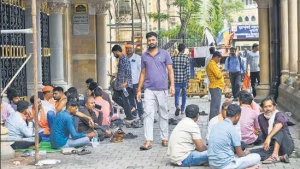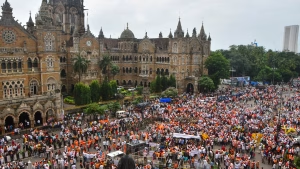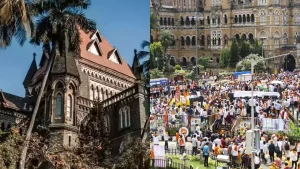Maharashtra – The Maratha Quota Protest has brought Mumbai’s bustling commercial districts to their knees, as activist Manoj Jarange Patil’s indefinite hunger strike at Azad Maidan continues to disrupt business operations across South Mumbai. With over 50,000 supporters gathering to demand a 10 percent quota for Marathas under the Other Backward Classes category, the demonstration has created unprecedented challenges for the city’s economy.
The protest, which began on Friday, has transformed normally vibrant commercial areas into deserted zones, forcing thousands of businesses to grapple with severe financial losses during what should have been a peak sales period.
Widespread Business Disruption Across Commercial Hubs

The Maratha Quota Protest has severely affected major commercial areas including Crawford Market, Zaveri Bazaar, Nariman Point, and Fashion Street. These locations, typically bustling with weekend shoppers and tourists, have experienced dramatic drops in footfall since the agitation began.
Viren Shah, president of the Federation of Retail Traders Welfare Association and owner of Roopam Store, reported that more than 5,000 wholesale shops in the Crawford Market area have been adversely affected. The timing of the Maratha Quota Protest has proven particularly damaging, coinciding with the festive season when retailers typically experience their highest sales volumes.
Weekend sales, which form the backbone of many retail operations, have been completely disrupted. Deepak Parikh, partner at Roopmilan, a popular clothing store near Marine Lines, described how their weekend sale “simply ended before it began” as customers called to say they couldn’t reach the store due to traffic congestion and safety concerns related to the ongoing demonstrations.
Restaurant and Entertainment Sectors Face Severe Losses
The impact of the Maratha Quota Protest extends beyond retail, with restaurants and entertainment venues reporting catastrophic revenue drops. Bhavesh Patel, who operates World of Palates restaurant and World of Wines liquor store in CR2 Mall at Nariman Point, revealed that business has declined by nearly 75 percent since the protests began.
His 144-seater restaurant remained largely empty throughout the weekend, while even food delivery orders through platforms like Swiggy and Zomato experienced significant drops. Despite fixed costs including rentals, salaries, GST payments, and EMI obligations continuing, revenue has almost completely stopped, highlighting the severe financial strain businesses face during the Maratha Quota Protest.
Traffic Chaos and Public Safety Concerns

The Maratha Quota Protest has created massive traffic disruptions throughout South Mumbai, with constant snarls making it difficult for customers to reach commercial areas. Many residents have chosen to remain indoors due to safety concerns and transportation difficulties, further reducing business activity.
Prayas Sanganeria of Prime World of Luxury Writing in Nariman Point noted that people are avoiding unnecessary trips outside their homes due to persistent traffic problems and reports of violence associated with the demonstrations. This behavioral change has compounded the economic impact on local businesses.
Incidents of Violence Mar Peaceful Demonstration


While the Maratha Quota Protest has largely remained peaceful, several concerning incidents have occurred. On Sunday evening, protesters allegedly assaulted passengers on a BEST bus in Juhu, stopping route number 201 around 7:15 PM, attacking a passenger, and damaging a window before fleeing the scene. Police have registered a complaint regarding this incident.
Additional disruptions occurred on Monday when protesters blocked roads near Chhatrapati Shivaji Maharaj Terminus and Crawford Market, temporarily affecting traffic flow. Joint Commissioner of Police Anil Kumbhare confirmed that while disturbances occurred at multiple locations including the Eastern Freeway, authorities managed to bring the situation under control.
Economic Recovery Challenges


Businesses that remained closed during the initial days of the Maratha Quota Protest attempted to reopen on Sunday and Monday but reported minimal or no customer footfall. The extended nature of the demonstration, with Jarange Patil’s indefinite hunger strike continuing, has created uncertainty about when normal business operations might resume.
Small businesses and shopkeepers face particular challenges, as they cannot afford extended closures but also struggle to generate revenue even when open. Fixed operational costs continue to accumulate while income streams have been severely curtailed.
Calls for Government Intervention
Traders’ associations have urgently appealed to the government to resolve the deadlock surrounding the Maratha Quota Protest as quickly as possible. The business community emphasizes that prolonged disruption will lead to deeper financial losses that could have lasting effects on Mumbai’s economy.
The demand for a 10 percent quota for Marathas under the OBC category has created a complex political situation that requires careful negotiation and resolution. Business leaders stress that while they respect the right to peaceful protest, the economic impact on thousands of livelihoods necessitates swift government action.
As one trader summarized the situation: the inability to stay closed is matched only by the futility of remaining open without customers, creating an impossible situation that can only be resolved through prompt government intervention to address the underlying issues driving the Maratha Quota Protest.

